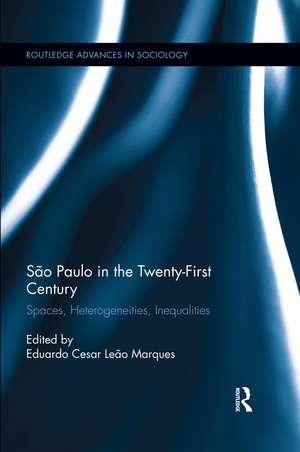São Paulo in the Twenty-First Century: Spaces, Heterogeneities, Inequalities: Routledge Advances in Sociology
Editat de Eduardo Cesar Leão Marquesen Limba Engleză Paperback – 14 aug 2020
The book shows that it is necessary to escape from dual and polarity interpretations. This did not lead to the complete disappearance of a crudely radial and concentric structure (not only due to geographic path dependence), but superposes other elements over it, leading to more complexes and continuous patterns. A general summary of these elements could perhaps be stated as pointing to greater social/spatial heterogeneity, accompanied by smaller, but reconfigured inequalities.
| Toate formatele și edițiile | Preț | Express |
|---|---|---|
| Paperback (1) | 260.40 lei 6-8 săpt. | |
| Taylor & Francis – 14 aug 2020 | 260.40 lei 6-8 săpt. | |
| Hardback (1) | 729.55 lei 6-8 săpt. | |
| Taylor & Francis – 23 iun 2016 | 729.55 lei 6-8 săpt. |
Din seria Routledge Advances in Sociology
-
 Preț: 385.10 lei
Preț: 385.10 lei -
 Preț: 152.38 lei
Preț: 152.38 lei -
 Preț: 309.12 lei
Preț: 309.12 lei - 20%
 Preț: 296.87 lei
Preț: 296.87 lei -
 Preț: 334.09 lei
Preț: 334.09 lei -
 Preț: 204.46 lei
Preț: 204.46 lei - 9%
 Preț: 865.97 lei
Preț: 865.97 lei -
 Preț: 310.81 lei
Preț: 310.81 lei -
 Preț: 326.40 lei
Preț: 326.40 lei -
 Preț: 311.41 lei
Preț: 311.41 lei - 8%
 Preț: 388.97 lei
Preț: 388.97 lei -
 Preț: 288.87 lei
Preț: 288.87 lei -
 Preț: 311.33 lei
Preț: 311.33 lei -
 Preț: 311.41 lei
Preț: 311.41 lei -
 Preț: 303.42 lei
Preț: 303.42 lei -
 Preț: 301.50 lei
Preț: 301.50 lei -
 Preț: 326.63 lei
Preț: 326.63 lei -
 Preț: 152.29 lei
Preț: 152.29 lei -
 Preț: 311.41 lei
Preț: 311.41 lei -
 Preț: 309.94 lei
Preț: 309.94 lei -
 Preț: 316.13 lei
Preț: 316.13 lei -
 Preț: 160.58 lei
Preț: 160.58 lei -
 Preț: 334.09 lei
Preț: 334.09 lei -
 Preț: 309.46 lei
Preț: 309.46 lei -
 Preț: 386.77 lei
Preț: 386.77 lei - 8%
 Preț: 388.91 lei
Preț: 388.91 lei -
 Preț: 310.60 lei
Preț: 310.60 lei -
 Preț: 310.22 lei
Preț: 310.22 lei -
 Preț: 310.51 lei
Preț: 310.51 lei -
 Preț: 283.77 lei
Preț: 283.77 lei -
 Preț: 311.41 lei
Preț: 311.41 lei -
 Preț: 295.09 lei
Preț: 295.09 lei - 8%
 Preț: 383.57 lei
Preț: 383.57 lei - 18%
 Preț: 1111.55 lei
Preț: 1111.55 lei -
 Preț: 445.38 lei
Preț: 445.38 lei - 18%
 Preț: 701.88 lei
Preț: 701.88 lei - 18%
 Preț: 1053.92 lei
Preț: 1053.92 lei - 18%
 Preț: 1002.36 lei
Preț: 1002.36 lei - 18%
 Preț: 1057.89 lei
Preț: 1057.89 lei - 16%
 Preț: 248.31 lei
Preț: 248.31 lei - 18%
 Preț: 1003.30 lei
Preț: 1003.30 lei - 18%
 Preț: 1109.21 lei
Preț: 1109.21 lei - 18%
 Preț: 997.11 lei
Preț: 997.11 lei - 18%
 Preț: 1061.22 lei
Preț: 1061.22 lei - 18%
 Preț: 1058.06 lei
Preț: 1058.06 lei - 18%
 Preț: 1002.36 lei
Preț: 1002.36 lei - 18%
 Preț: 1113.12 lei
Preț: 1113.12 lei
Preț: 260.40 lei
Nou
Puncte Express: 391
Preț estimativ în valută:
49.83€ • 52.02$ • 41.24£
49.83€ • 52.02$ • 41.24£
Carte tipărită la comandă
Livrare economică 04-18 aprilie
Preluare comenzi: 021 569.72.76
Specificații
ISBN-13: 9780367596569
ISBN-10: 0367596563
Pagini: 260
Dimensiuni: 152 x 229 x 14 mm
Greutate: 0.35 kg
Ediția:1
Editura: Taylor & Francis
Colecția Routledge
Seria Routledge Advances in Sociology
Locul publicării:Oxford, United Kingdom
ISBN-10: 0367596563
Pagini: 260
Dimensiuni: 152 x 229 x 14 mm
Greutate: 0.35 kg
Ediția:1
Editura: Taylor & Francis
Colecția Routledge
Seria Routledge Advances in Sociology
Locul publicării:Oxford, United Kingdom
Public țintă
Postgraduate and UndergraduateCuprins
Introduction: Heterogeneities and Inequalities in a Southern Metropolis
[Eduardo Cesar Leão Marques]
1. São Paulo, Histories, Institutions and Legacies
[Eduardo Cesar Leão Marques]
Part I: Economic Processes and Social Structure
2. Socioeconomic Transformations and Social Structure
[Eduardo Cesar Leão Marques, Rogério Jerônimo Barbosa and Ian Prates]
3. Labour Market, Income Inequalities and Poverty
[Rogério Jerônimo Barbosa and Ian Prates]
Part II: Demographic Dynamics and Segregation
4. Population Dynamics and Migration: 1991-2010
[José Marcos Pinto da Cunha]
5. Diverse Demographic Trajectories and Heterogeneity
[Eduardo Cesar Leão Marques and Carolina Requena]
6. The Social Spaces of the Metropolis in the 2000s
[Eduardo Cesar Leão Marques]
7. Inequalities and Residential Segregation by Race and Class
[Danilo França]
Part III: Processes of Space Production
8. The Dynamics of São Paulo's Favelas: Socioeconomic Conditions and Territorial Patterns
[Camila Pereira Saraiva]
9. Public Housing Production
[Eduardo Cesar Leão Marques and Leandro de Pádua Rodrigues]
10. Private Sector Housing Developments: Who Produces What, How and Where?
[Telma Hoyler]
11. Mobility Inequalities in a Road Transport System
[Carolina Requena]
[Eduardo Cesar Leão Marques]
1. São Paulo, Histories, Institutions and Legacies
[Eduardo Cesar Leão Marques]
Part I: Economic Processes and Social Structure
2. Socioeconomic Transformations and Social Structure
[Eduardo Cesar Leão Marques, Rogério Jerônimo Barbosa and Ian Prates]
3. Labour Market, Income Inequalities and Poverty
[Rogério Jerônimo Barbosa and Ian Prates]
Part II: Demographic Dynamics and Segregation
4. Population Dynamics and Migration: 1991-2010
[José Marcos Pinto da Cunha]
5. Diverse Demographic Trajectories and Heterogeneity
[Eduardo Cesar Leão Marques and Carolina Requena]
6. The Social Spaces of the Metropolis in the 2000s
[Eduardo Cesar Leão Marques]
7. Inequalities and Residential Segregation by Race and Class
[Danilo França]
Part III: Processes of Space Production
8. The Dynamics of São Paulo's Favelas: Socioeconomic Conditions and Territorial Patterns
[Camila Pereira Saraiva]
9. Public Housing Production
[Eduardo Cesar Leão Marques and Leandro de Pádua Rodrigues]
10. Private Sector Housing Developments: Who Produces What, How and Where?
[Telma Hoyler]
11. Mobility Inequalities in a Road Transport System
[Carolina Requena]
Notă biografică
Eduardo Cesar Leão Marques is a Livre-docente professor at the Department of Political Science at USP and researcher at the Center for Metropolitan Studies.
Descriere
This book provides a deep analysis of the social, spatial and economic transformations of São Paulo in recent decades in terms of social structure, inequalities, demography, processes of space production and segregation. The resulting picture shows stability in segregation, intense spatial changes and less intense, but reconfigured social inequa












